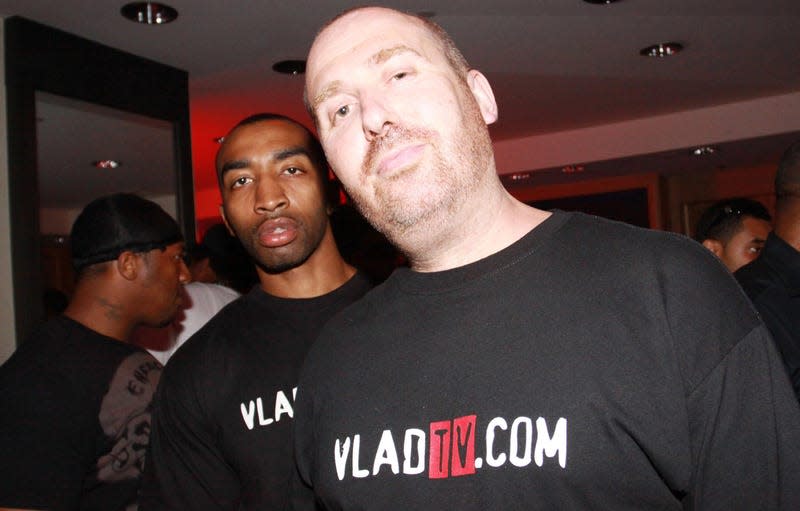Why Hip-Hop Interviewer DJ Vlad is the White Culture Vulture the Genre Can Do Without

- Oops!Something went wrong.Please try again later.
The Kendrick-Drake battle has taught us many things – among them is that our tolerance for culture vultures has diminished in 2024. It’s why DJ Vlad, one of Hip-Hop’s premiere buzzards, might finally be experiencing the reckoning he’s had coming for some time now.
We finally getting @djvlad up outta here?! A great weekend indeed. pic.twitter.com/AaUppoOQ3v
— Kevín (@KevOnStage) May 5, 2024
In what might’ve been a throwaway tweet if it came from someone else, Vladislav Lyubovny demonstrated exactly why so many people in the Hip-Hop community can’t stand him: After Kendrick Lamar released his anti-Drake hit “Not Like Us,” Vlad went to Twitter (sorry, I’ll never call it X) to complain about the song’s mixing quality.
Author and Princeton University Professor Morgan Jerkins told Vlad that this was a Black issue and that his voice wasn’t needed. Vlad responded by threatening to reach out to Princeton to tell the school that Jerkins “is telling me that a white person shouldn’t be allowed to voice their opinion about Hip-Hop.”
Vlad was thoroughly dragged for his response to Jerkins and attempted clean-up and denial in a follow-up tweet, but Jerkins wasn’t going: She alleges Vlad contacted her family.
A lie. He tagged my employer multiple times with the intention to professionally harm me. I didn’t troll. I centered Black people in a discussion on hip-hop and told him to stand down bc it’s not his space.
He’s backtracking bc he miscalculated.
Btw, stop contacting my family. pic.twitter.com/Y2dVryuCU8— Morgan Jerkins (@MorganJerkins) May 6, 2024
This is only Vlad’s latest transgression against Black folks. He’s worked in and around Hip-Hop for decades, starting as a producer and DJ before planting his flag early during the YouTube boom. To his credit, he often snags interviews with artists early in their careers and paints essential background information about them before they become stars — I admit that I’ve used his videos as research for new artists that I’m covering.
But Vlad developed a horrible reputation for a reason: he often coaxes artist into incriminating themselves, admitting to alleged crimes on camera. He cashes in on new artists’ worst instincts of machismo and pursuit of street credibility and gladly boasts about the YouTube views that come with the drama.
*interrogation 🤔 I heard you the feds on low ?😂 https://t.co/fxfU5cU9r7
— August Alsina (@AugustAlsina) January 4, 2020
This exploitative bottom-feeding approach may help Vlad’s bank account, but it’s a terrible look for Hip-Hop: It perpetuates stereotypes that already plague the genre and Black people writ large, inflames tension between foes that can lead to more violence and makes these artists even more of a target for law enforcement than they already are.
Hip-hop fans and media personalities alike have repeatedly taken him to task, but views are the priority for Vlad: His Twitter bio proudly boasts 5 million subscribers for his YouTube, and that’s his bottom line.
As off-base as his assessment is of the mix of “Not Like Us,” he’s welcome to have an opinion on the song — the issue here is the way he handled Jerkins’ post. He could’ve easily just defended his opinion (as he did in an exchange with Bomani Jones), stuck up for his right to have an opinion as a participant in Hip-Hop or simply ignored the tweet altogether.
But attempting to have a Black woman reprimanded by her employer was unnecessary. Frankly, it’s the most Karen-esque response possible: instead of holding his ground or letting it go, he decided to call the manager. And despite his attempts to hide his hand by stating days later that he was “trolling” and didn’t actually plan to reach out to Princeton, it’s indisputable that he tagged the venerable institution several times during the dispute.
Me watching DJ VLAD get collectively whacked by Black Twitter for extreme use of culture vulture practices. It’s that yt audacity that gets them eaten up every time. pic.twitter.com/JCZK0m0jcN
— THE SOCIAL BIBLE 📖 (@alexactivated) May 5, 2024
Making matters worse was his subsequent response to the backlash. On Monday, when he revisited the conversation, he offered to discuss the issue in future interviews. As always with Vlad…numbers first.
Vlad’s handling of this disagreement with Jerkins mirrors his relationship with Hip-Hop: relentlessly pursuing engagement with no regard for the impact his actions would have on others. It’s time to get him outta here for good.
————
William Ketchum III is a Brooklyn-based freelancer.

